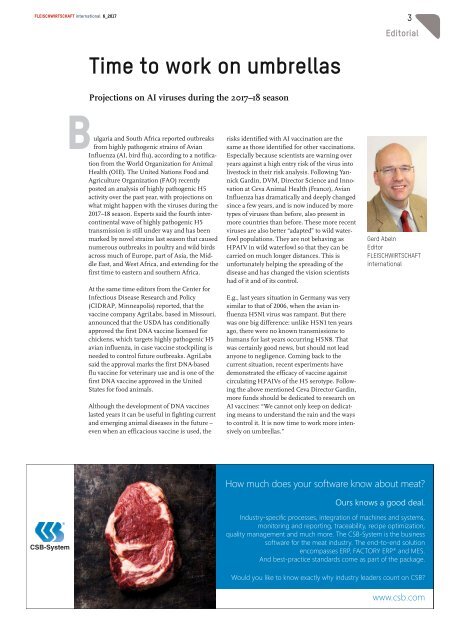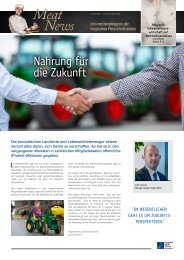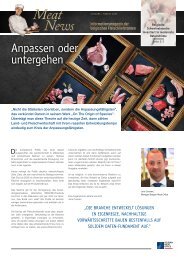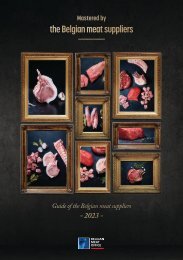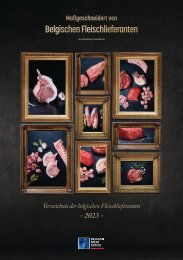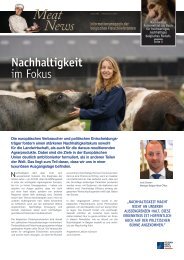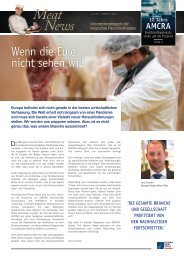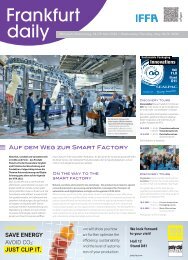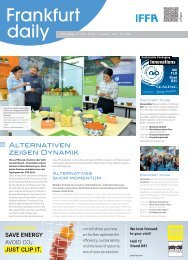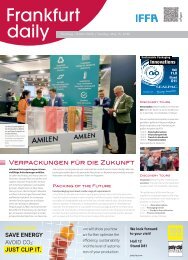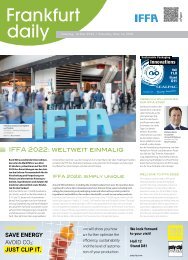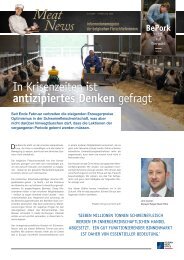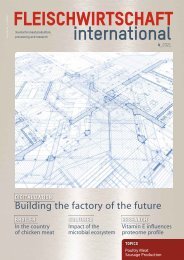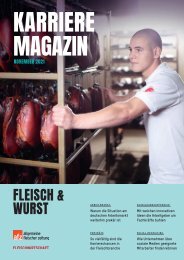FLEISCHWIRTSCHAFT international 6/2017
You also want an ePaper? Increase the reach of your titles
YUMPU automatically turns print PDFs into web optimized ePapers that Google loves.
Fleischwirtschaft <strong>international</strong> 6_<strong>2017</strong><br />
3<br />
Time to work on umbrellas<br />
Projections on AI viruses during the <strong>2017</strong>–18season<br />
Editorial<br />
Bulgaria and South Africa reported outbreaks<br />
from highly pathogenic strains of Avian<br />
Influenza (AI, bird flu), according to anotification<br />
from the World Organization for Animal<br />
Health (OIE). The United Nations Food and<br />
Agriculture Organization (FAO) recently<br />
posted an analysis of highly pathogenic H5<br />
activity over the past year,with projections on<br />
what might happen with the viruses during the<br />
<strong>2017</strong>–18 season. Experts said the fourth intercontinental<br />
wave of highly pathogenic H5<br />
transmission is still under way and has been<br />
marked by novel strains last season that caused<br />
numerous outbreaks in poultry and wild birds<br />
across much of Europe, part of Asia, the Middle<br />
East, and West Africa, and extending for the<br />
first time to eastern and southern Africa.<br />
At the same time editors from the Center for<br />
Infectious Disease Research and Policy<br />
(CIDRAP, Minneapolis) reported, that the<br />
vaccine company AgriLabs, based in Missouri,<br />
announced that the USDA has conditionally<br />
approved the first DNA vaccine licensed for<br />
chickens, which targets highly pathogenic H5<br />
avian influenza, in case vaccine stockpiling is<br />
needed to control future outbreaks. AgriLabs<br />
said the approval marks the first DNA-based<br />
flu vaccine for veterinary use and is one of the<br />
first DNA vaccine approved in the United<br />
States for food animals.<br />
Although the development of DNA vaccines<br />
lasted years it can be useful in fighting current<br />
and emerging animal diseases in the future –<br />
even when an efficacious vaccine is used, the<br />
risks identified with AI vaccination are the<br />
same as those identified for other vaccinations.<br />
Especially because scientists are warning over<br />
years against ahigh entry risk of the virus into<br />
livestock in their risk analysis. Following Yannick<br />
Gardin, DVM, Director Science and Innovation<br />
at Ceva Animal Health (France), Avian<br />
Influenza has dramatically and deeply changed<br />
since afew years, and is now induced by more<br />
types of viruses than before, also present in<br />
more countries than before. These more recent<br />
viruses are also better “adapted”towild waterfowl<br />
populations. They are not behaving as<br />
HPAIV in wild waterfowl so that they can be<br />
carried on much longer distances. This is<br />
unfortunately helping the spreading of the<br />
disease and has changed the vision scientists<br />
had of it and of its control.<br />
E.g., last years situation in Germany was very<br />
similar to that of 2006, when the avian influenza<br />
H5N1virus was rampant. Butthere<br />
was one big difference: unlike H5N1ten years<br />
ago, there were no known transmissions to<br />
humans for last years occurring H5N8. That<br />
was certainly good news, but should not lead<br />
anyone to negligence. Coming back to the<br />
current situation, recent experiments have<br />
demonstrated the efficacy of vaccine against<br />
circulating HPAIVsofthe H5 serotype. Following<br />
the above mentioned Ceva Director Gardin,<br />
more funds should be dedicated to research on<br />
AI vaccines: “Wecannot only keep on dedicating<br />
means to understand the rain and the ways<br />
to control it. It is now time to work more intensively<br />
on umbrellas.”<br />
GerdAbeln<br />
Editor<br />
<strong>FLEISCHWIRTSCHAFT</strong><br />
<strong>international</strong>


